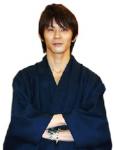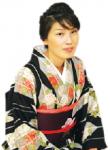2021/04/09
Easy Peasy Japaneasy - おいしいクラノスケ?

学習者の観点から、ちょっと日本語と日本文化を見てみませんか。
日本人では気付かない鋭い指摘に、あなたはどこまで答えられますか。
Let me share with you some real stories happening to students –
how much do you know about Japanese language and its culture?
| おいしいクラノスケ? |
オーストラリア人の夫と「忠臣蔵」を見ました。英語字幕もあったので、忠義に生きる男のドラマを主人もしっかり楽しめた様子。エンドロールが流れ始め、いつ見ても美しいお話…なんてうっとりしていると、横で夫が叫び出した。「クール! おいしい倉助、クール!」…。え…っと、聞き間違いかな…? もう1度言わせてみると、やっぱり“大石内倉助”を“おいしい倉助”と言っています。考えてみると、確かにどちらも表記はOISHI…です!
「あー、いー、うー、えー、おー」のように引く音を聞き分けるのは、学習者にとっては至難の業。「大阪」を「おさか」だと思っていた、「おばさん」に「おばあさん」と声をかけて嫌な顔をされた(どっちを使っても失礼だと思うのですが)、日本人との間に生まれたお子さんの名前を「有名」に命名したというので驚いたが、よくよく聞いたら「夢」だった、とか…そんな事はざらにあります。
日本語の音は、仮名一文字を一拍として数えます。だから、ゆめは2拍、ゆうめいは4拍、という事になります。周りのお友達で、違いが分からない学習者がいれば、拍の分だけ手を叩いてあげると、少し感覚をつかんでもらえるかもしれません。そうすれば、まあまあ好きですと言いたかったのを「ママ好きです」と言って笑われたり、ビールの事を「ビルを飲みます」と言ってびっくりされたりする学習者も減るのではないでしょうか。
でも、こういった間違いをする学習者のおかげで、今まで考えもしなかったけれど、意外にも似ている言葉を発見する事もある、という例を、最後に1つ紹介したいと思います。先日のレッスン中、日本人で誰が一番好きですか? と聞いたところ、その学生は「お使いです」と答えました。新しい芸能人? と聞くと、いいえ、とその人の歌を口ずさんでくれました。
みなさん、誰のことか分かりますか…? まさか、その答えが大塚愛などとは夢にも思わなかったでしょう? 簡単といわれる日本語発音にも、こんな難点があったのですね。
| Tasty Kuranosuke? |
I watched the Japanese movie called ‘The 47 Ronin’ with my Australian husband. Thanks to the English subtitles, he seemed to enjoy the movie which is themed around Samurai loyalty. It is a famous story; you may recognise the main character’s name, ‘Ooishi Kuranosuke’. After the movie, my husband said to me “Cool, Oishii Kuranosuke is cool!” …Oishii? Is he saying ‘Tasty (Oishii) Kuranosuke’? No wonder he said that, the subtitle showed ‘Oishi’, which can be read both ‘Ooishi’ and ‘Oishii’.
The long sounds such as ‘aa,ii,uu,ee,ei,oo,ou’ are hard to recognise for a Japanese learner. Some students don’t realise that ‘Osaka’ is actually written and pronounced ‘Oosaka’, or the difference between ‘Obasan’ (Old lady, Aunt) and ‘Obaasan’ (Very old lady, grandmother). One of my students married a Japanese lady and they had a baby, the student told me that he named his baby Yuumei (famous). It took me a while to click that he was actually saying ‘Yume’ (Dream).
A single Japanese character is counted as one syllable. ‘Yume’ (Dream) has two syllables whilst ‘Yuumei (Famous) has four syllables. To improve your understanding, try to learn the words carefully when you come across new words, and listen carefully to how many syllables are in the words. Ask your Japanese friends to pronounce these examples – Mama (Mum) vs Maamaa (so-so), Biru (building) vs Biiru (Beer). I often hear that students say “Biru wo nomimasu“ (I drink billing).
In addition, there are the words which have similar pronunciations however we don’t realise the similarity until students find out. I would like to share an example here. In one of my lessons I asked a student “Who is your favourite Japanese celebrity”? He replied. “Otsukai” (errand). I then asked him “Is that a new band or something?”, he replied, “No, it is a girl singer.” While listening to his humming, I realised that he meant Ootsuka Ai, who is a very popular singer. It is said that Japanese pronunciation is easier than English, but is this definitely an exception to the rule.
 Japaneasy 日本語学校
Japaneasy 日本語学校

M: 0422-266-308
W: www.japaneasy.com.au
E:reception@japaneasy.com.au
Level 1, 152 Little Lonsdale St. Melbourne
W: www.japaneasy.com.au
E:reception@japaneasy.com.au
Level 1, 152 Little Lonsdale St. Melbourne
Japaneasy日本語教師養成講座420時間コース 受付中!
★メルボルンで日本語教師の資格を取って活躍の場を広げよう★
★メルボルンで日本語教師の資格を取って活躍の場を広げよう★
